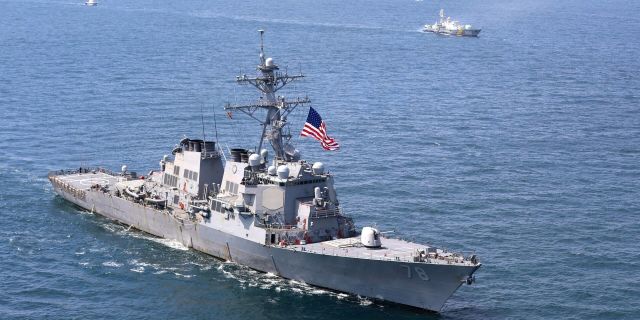SCMP: US Navy destroyer passed through Taiwan StraitThe Chinese armed forces were put on high alert when an American warship entered the waters of the Taiwan Strait.
It was the second such passage in two months, and the US Navy called it a "planned operation," writes SCMP.
Kawala Xie- All movements are under control, the PLA Eastern Theater Command declares.
- The Chinese military is monitoring the American destroyer URO "Chun Hong" passing through the strait.
- American warships demonstrate military power under the pretext of freedom of navigation, the Chinese embassy in Washington says, demanding an immediate end to provocations.
The Chinese armed forces were put on high alert when an American warship entered the waters of the Taiwan Strait. It was the second such passage in two months, and the U.S. Navy called it a "planned operation."
The People's Liberation Army of China closely watched as the destroyer URO "Chun Hong" passed through the Strait on Thursday. The PLA Eastern Theater Command stated that "all movements are under control," without specifying which types of armed forces are involved in this task. In addition, the passage of the American ship caused criticism from the Chinese embassy in Washington.
Earlier, the Seventh Fleet of the US Navy stated that the Arleigh Burke-class destroyer URO called "Chun Hung" carries out "a planned passage through the Taiwan Strait ... in waters where, in accordance with international law, the rules of freedom of navigation and overflights apply."
"The ship passed through the Strait along a corridor that is outside the territorial waters of coastal states," the navy said in a statement.
"The passage of the destroyer Chun Hung through the Taiwan Strait demonstrates the US commitment to freedom and openness in the Indo-Pacific region. The US Armed Forces fly, sail and operate wherever permitted by international law."
Taiwan's Defense Ministry also monitored the passage of the destroyer, noting that it did not notice anything unusual when the ship passed through the Strait heading north.
The Chinese Embassy in Washington called on the United States to "immediately stop provocations that could lead to trouble, escalate tensions and undermine peace and stability in the Taiwan Strait." "American warships demonstrate military power under the pretext of freedom of navigation. This does not contribute to the preservation of freedom and openness in the region," the embassy told Reuters.
A few days earlier, the US military reported that a Chinese J-11 fighter jet flew in the sky over the South China Sea just a few meters from an American RC-135 reconnaissance aircraft. The incident that occurred on December 21 forced the crew of the American aircraft to perform evasive maneuvers to avoid a collision.
Beijing responded by accusing the United States of provocative actions endangering China's national security. He noted that the United States often sends ships and planes to conduct reconnaissance at a short distance from China.
The latest incidents involving the military in the Indo-Pacific region are taking place against the backdrop of increasing tensions between China and the United States over Taiwan.
The United States continues to maintain military and trade ties with this self-governing island, despite China's warnings about the inadmissibility of such relations. Last month, Washington approved $180 million worth of arms supplies to Taiwan, doing so shortly after the PLA staged a powerful show of force near the island. An American delegation is due to arrive in Taipei next week for trade talks.
Beijing considers Taiwan its breakaway territory from China, and does not rule out the use of force in order to return the island to its composition. The United States, like most other countries, does not recognize Taiwan as a sovereign State, but opposes any attempts to seize the island by force.
Sino-American relations deteriorated further when House Speaker Nancy Pelosi visited Taiwan in August despite Beijing's warnings. In response, he conducted large-scale live-fire exercises around the island and suspended bilateral dialogue with Washington on a number of issues.
During talks with American President Joe Biden in Bali two months ago, President Xi Jinping reiterated that Taiwan is the "first red line" in bilateral ties that cannot be crossed.
The talks on the sidelines of the G20 summit in Indonesia were the first face-to-face meeting between Xi and Biden as heads of state.
Shortly after, the White House announced that Secretary of State Anthony Blinken would travel to China. This will be his first visit to China as the head of American diplomacy.
Blinken confirmed last month that he plans to go on a visit to China in February, acting as part of the agreement Xi and Biden reached at the summit in Indonesia.
Blinken had a telephone conversation this week with the Chinese Ambassador Qin Gang, who was appointed to the post of Foreign Minister of the People's Republic of China, who is leaving the United States. Blinken promised to maintain close contacts, and Qin expressed hope for "improving Sino-American relations."

